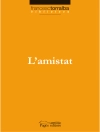‘The Will to Power: An Attempted Transvaluation of All Values’ is an ambitious manuscript by Friedrich Nietzsche, exploring the concept of power as the essence of all life and reality. Compiled posthumously, this work represents Nietzsche’s challenge to traditional moral values, proposing instead a philosophy that places the will to power at the core of human existence. Through a series of aphorisms and reflections, Nietzsche delves into the dynamics of power, creativity, and the potential for human enhancement. This profound collection invites readers to reconsider the foundations of ethics, culture, and knowledge, marking a pivotal moment in philosophical thought.
Beli ebook ini dan dapatkan 1 lagi PERCUMA!
Bahasa Inggeris ● Format EPUB ● Halaman-halaman 733 ● ISBN 9781787360600 ● Saiz fail 1.6 MB ● Penerbit Interactive Media ● Diterbitkan 2019 ● Muat turun 24 bulan ● Mata wang EUR ● ID 7201529 ● Salin perlindungan tanpa












